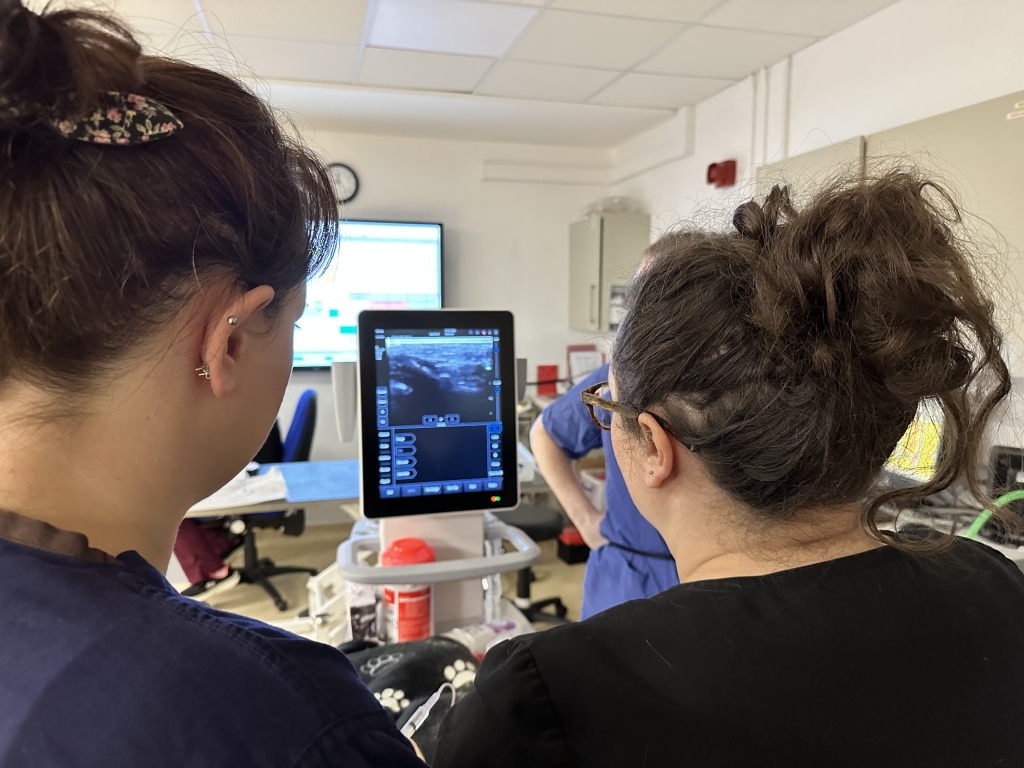
Cave Veterinary Specialists has invested more than £25,000 to advance its targeted anaesthesia care for pets.
Somerset Animal Hospital Invests £25,000 In Targeted Anaesthesia Care For Pets
One of the South West’s leading animal hospitals has invested more than £25,000 to advance its targeted anaesthesia care for pets.
Linnaeus-owned Cave Veterinary Specialists, which is based near Wellington, Somerset, has added a £15,000 state-of-the-art Mindray TE5 ultrasound scanner and invested more than £10,000 in additional training for its experienced anaesthesia team.
Cave anaesthetist Pippa Tucker said the investment will keep the practice at the forefront of anaesthesia care, particularly locoregional – or nerve block – anaesthesia.
The scanner enables the anaesthetist to see the nerves they are targeting as well as the anatomy around those nerves.
The operator then uses this visualisation to closely target the nerves that need to be numbed while safely avoiding other structures such as blood vessels.
Pippa said: “We are all excited by the arrival of the hi-tech Mindray TE5 ultrasound scanner, which includes many technological advances compared to our previous scanners, several that are designed specifically for locoregional anaesthesia.
“Ultrasound guided regional anaesthesia is a rapidly-developing field and is the most up-to-date technique for providing safe and effective regional anaesthesia in humans and veterinary patients.
“We use it to provide complete pain relief for pets needing surgery, to control post-operative pain and to treat painful injuries or conditions.
“The new scanner gives us excellent image quality and needle visualisation to increase confidence in identifying and targeting the correct anatomy.
“It’s a huge advance in dealing with cases requiring orthopaedic surgery, such as fractures or a Tibial Plateau Levelling Osteotomy, in abdominal and thoracic surgery and also in maxillofacial surgery.
“We now routinely have cases that do not require strong opioid pain relief after major surgery or procedures because of these successful nerve blocks.”
All three of Cave’s anaesthetists have completed an intensive, three-day course in ultrasound guided techniques and three of the four anaesthesia nurses have attended a two day course, with their fourth nurse attending this year.
Pippa said the team's extra training and increased capabilities is already making a huge difference to the hospital’s patients.
She added: “Our intensive training in ultrasound guided techniques means our team is skilled and confident in the most up-to-date techniques for providing these blocks.
“It is very rewarding to see our anaesthesia nurses given the opportunity to develop their skills and perform these prodedures. Their commitment to advanced anaesthesia training has allowed them to learn techniques which very few nurses and vets in the UK have the opportunity to learn.
“Many of these blocks are technically challenging and require a high degree of skill to understand and to scan the relevant anatomy so we can then accurately guide the needle to the exact position required.
“Since our training we have all noticed a huge improvement in both the team’s confidence and success in providing increasingly complex regional nerve blocks.”
For more information on Cave Veterinary Specialists, visit https://cave-vet-specialists.co.uk or search for Cave Veterinary Specialists on social media.
More from Linnaeus Group
- Mars Veterinary Health publishes 2025 Science Impact Report highlighting global advances in pet health
- AMVS specialist gets to heart of puppy's problem
- Garston Veterinary Group team earn BVRA recognition
- Chihuahua Lola loving life after 'challenging' spinal surgery
- Vets save therapy cat's life following road accident

 1 year ago
1 year ago  997 views
997 views

 7 hours ago
7 hours ago